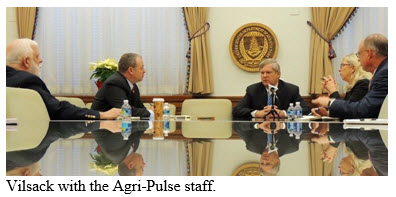WASHINGTON, Dec. 14, 2016 - The livestock and poultry sector is watching USDA for the expected release of its new regulations on contracting practices. The regulations, which the department is calling Farmer Fair Practices Rules, could be released by the Grain Inspection, Packers and Stockyards Administration as soon as today, sources say.
USDA also is expected to release soon its new animal welfare standards for organic livestock and poultry.
Vilsack slams Trump on transition. Agriculture Secretary Tom Vilsack doesn’t believe that President-elect Donald Trump is giving USDA the attention it deserves.
During an exit interview with Agri-Pulse, Vilsack said that Trump’s transition team has barely appeared at USDA since the election and hasn’t taken advantage of the efforts by USDA staff to get the incoming administration up to speed.
"I’m disappointed that we still haven’t had an ag
secretary nominee and we haven’t had much activity from the transition team,”
Vilsack said.
Vilsack noted that his staff had prepared offices and briefing materials for the transition team. “It’s a little puzzling why given the magnitude and the reach of this department that people haven't been more engaged, given the opportunity to learn,” Vilsack said.
Leftwich referred questions to the transition media office, which didn’t respond to a request for comment. As we’ve pointed out, Vilsack wasn’t named agriculture secretary until Dec. 17, 2008, so Trump isn’t behind that schedule yet.
For more from our interview with Vilsack, be sure and read this week’s Agri-Pulse newsletter.

Reports: Interior post goes to Montana congressman. First-term Montana Rep. Ryan Zinke has reportedly accepted an offer to serve as Interior secretary. Zinke, a former Navy SEAL, has been considered the Republicans’ best candidate to challenge Democratic Sen. Jon Tester in 2018.
There were multiple reports last week that the job was going to Washington Rep. Cathy McMorris Rodgers, and she met with Trump on Monday in New York. But yesterday evening signaled that she wasn’t getting the post, saying on Twitter that she was “energized more than ever to continue leading in Congress.”
Zinke, who’s a member of the House Natural Resources Committee, is a hunter and fisherman who has opposed the sale of public lands and supports full funding and permanent authorization for the Land and Water Conversation Fund. “He’s a great pick,” says Whit Fosburgh, president and CEO of the Theodore Roosevelt Conservation Partnership. Fosburgh describes him as “pro public lands to the point where he’s been willing to buck his own party.”
The League of Conservation Voters, however, gave him a score of only 3 percent for his first year in office in 2015. LCV hasn’t issued a scorecard for this year yet. The National Parks Conservation Association faults Zinke for his support of oil and gas development on federal lands.
Perry to DOE raises biofuel questions. There also are multiple reports that former Texas Gov. Rick Perry will be named as energy secretary, putting Perry in charge of a department that he proposed to abolish and that has been critical to funding development of advanced biofuels.
As governor, Perry appealed to EPA for waivers of the Renewable Fuel Standard. But he shifted on the issue during his brief presidential campaign in Iowa in 2015. During a presidential candidate summit in Des Moines, Perry said that in asking for waivers he was just doing what was best for his state at the time.
Perry, who also served as Texas agriculture commissioner, said it was too soon to remove the RFS when there are still subsidies and incentives for other forms of energy, but he also said that renewable energy policy ought to be left to the states.
In addition to funding biofuel research, the Energy Department has committed about $1 billion to biorefinery projects since 2007. The Advanced Biofuels Association declined comment on Perry’s possible nomination. Look for more on Perry’s background in this week’s Energy-Pulse.
EIA bullish on biodiesel growth. The Energy Information Agency sees biodiesel usage hitting 2.5 billion gallons in 2017, 500 million gallons more than required under the Renewable Fuel Standard. That would be up from 1.7 billion gallons just last year. The extra biodiesel usage will help meet the separate requirement the RFS for advanced biofuels.
Ethanol consumption is expected to be flat next year at 14.4 billion gallons.
EPA advisers scouring glyphosate findings. EPA’s conclusion that found glyphosate is unlikely to be a human carcinogen will get a thorough review from a Scientific Advisory Panel, if yesterday’s first meeting of the group is any indication.
EPA officials presented their evidence and fielded some tough questions Tuesday from panel members, a group of scientists appointed by EPA to offer their opinions on the data used by the agency.
Some panel members said EPA seemed to be ignoring its own guidelines for assessing carcinogenicity, for example by limiting consideration of studies that have higher feeding rates for test animals. But EPA officials said they were confident they followed the guidelines.
EPA also was questioned why it did not consider occupational exposure to glyphosate, but EPA said occupational risks are handled by OSHA.
The meeting continues through Friday, after which the panel has 90 days to deliver its report to EPA. All of today’s agenda is devoted to public comments. Speakers are signed up from Monsanto, Dow AgroSciences, CropLife America, the Center for Food Safety and Beyond Pesticides, among others.
The review is part of the EPA process for re-registering glyphosate.
He said it. “Eventually it got to a point where we were going to take their entire pay check.” - Agriculture Secretary Tom Vilsack tried his best to convince employees and lawmakers to change the name of the farm bill to something like the “food, farm and jobs bill.” At one point he had a jar in his office which he required staff members to put money if they were caught saying “farm bill.” Some of them apparently wouldn’t change their ways.
Steve Davies contributed to this report.
#30
For more news, go to: www.Agri-Pulse.com

